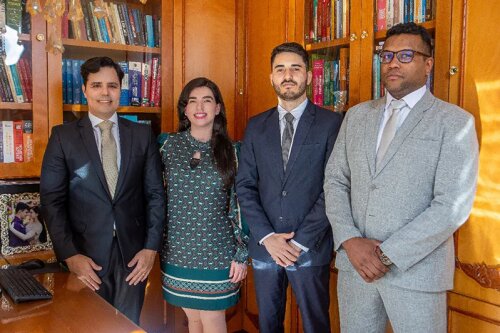Best Structured Finance Lawyers in Goiânia
Share your needs with us, get contacted by law firms.
Free. Takes 2 min.
List of the best lawyers in Goiânia, Brazil
About Structured Finance Law in Goiânia, Brazil
Structured Finance is a specialized area within finance that deals with complex financial transactions designed to manage risk and optimize funding through structured instruments. In Goiânia, Brazil, Structured Finance law is governed by both national Brazilian laws and regional practices tailored to the city’s robust commercial and real estate sectors. Typical transactions include securitization of receivables, issuance of debentures, project finance arrangements, and the use of specific vehicles such as FIDCs (Receivables Investment Funds) and CRIs (Real Estate Receivables Certificates). Legal professionals in Goiânia help individuals and companies navigate these instruments to ensure compliance and efficiency.
Why You May Need a Lawyer
Seeking legal advice for Structured Finance transactions in Goiânia is crucial due to the complexity involved. You may need a lawyer if you are:
- Raising capital for a large project or business expansion
- Securitizing assets or receivables
- Structuring or investing in investment funds such as FIDC or FII
- Participating in mergers, acquisitions, or joint ventures requiring financial engineering
- Accessing the real estate market through CRIs or CRAs (Agribusiness Receivables Certificates)
- Complying with local and federal regulations for financial products
- Resolving disputes regarding the execution or enforcement of structured finance agreements
A lawyer can help interpret legislation, draft and review contracts, mitigate risks, ensure tax efficiency, and represent your interests before regulatory bodies and courts.
Local Laws Overview
In Goiânia, Structured Finance is regulated under several national statutes, with local nuances shaped by the city’s economic profile and the State of Goiás’ regulations. Key legislative frameworks include:
- Civil Code - Governs general contract law, including structures used in finance.
- Law No. 9.514/1997 - Regulates real estate financing, including securitization of real estate receivables (CRIs).
- Law No. 12.431/2011 - Deals with incentivized debentures for infrastructure projects, which often use structured mechanisms.
- Central Bank and CVM (Securities Commission) Norms - Oversee the issuance of financial products and market practices.
- Tax legislation - Determines the tax treatment of structured instruments, which can vary locally and nationally.
Transactions in Goiânia often interact with state and municipal tax codes, zoning laws (for real estate), and local requirements for security interests registration. The interplay of these laws makes local counsel essential.
Frequently Asked Questions
What is structured finance and how does it differ from traditional finance?
Structured finance uses complex financial instruments and arrangements to allow organizations or individuals to achieve specific financial objectives, often involving the pooling of assets and risk mitigation. Unlike traditional bank loans or simple bond issuances, structured finance may involve securitizations, special purpose vehicles, and customized contracts.
Is structured finance regulated in Goiânia?
Yes, structured finance is subject to federal Brazilian regulations as well as guidelines from entities such as the Central Bank and the Securities and Exchange Commission (CVM), with additional state and municipal requirements in Goiânia.
What are the most common structured finance products in Goiânia?
The most common products include securitization of receivables through FIDCs and CRIs, real estate project finance, and infrastructure debenture issuances.
How can I use structured finance for real estate investment?
You can invest through vehicles like Real Estate Investment Funds (FIIs) or Real Estate Receivables Certificates (CRIs), which allow pooling and securitization of real estate-related income streams.
What should I consider when structuring a finance transaction?
Consider the regulatory framework, compliance requirements, tax implications, the legal robustness of the structures, and how risks are distributed among parties.
Are there specific risks involved in structured finance deals?
Yes, risks include regulatory changes, counterparty risk, credit risk of underlying assets, and issues arising from complex contract terms.
What role does CVM (Securities and Exchange Commission) play in Goiânia?
CVM oversees the registration and regulation of securities, including structured products, to ensure transparency, investor protection, and market integrity.
Can individuals as well as businesses access structured finance products?
Yes, both individuals and businesses can participate, although some products are typically geared toward institutional or qualified investors due to their complexity.
How is tax handled in structured finance transactions?
Tax treatment varies according to the specific instrument, transaction structure, and the roles of parties involved. Legal advice is essential to ensure compliance and tax efficiency.
What should I do if I suspect a breach or irregularity in a structured finance deal?
Consult a lawyer immediately to review documentation, identify breaches, and take protective measures, which may include notifying regulatory bodies or pursuing legal action.
Additional Resources
For those seeking more information or assistance in Structured Finance in Goiânia, consider the following organizations and governmental bodies:
- State Bar Association of Goiás (OAB-GO): Offers referral services and general legal information.
- Securities and Exchange Commission of Brazil (CVM): Regulatory guidelines and updates on structured products.
- Central Bank of Brazil: Rules and statistics related to financial operations.
- Regional commercial registry (Junta Comercial de Goiás): Corporate filings and business registrations.
- Local financial market associations and economic development agencies in Goiânia: Provide industry insights and support.
Next Steps
If you need legal assistance in Structured Finance in Goiânia:
- Identify your specific needs-whether for contract drafting, structuring a deal, dispute resolution, or regulatory compliance.
- Gather relevant documentation and background information on your intended transaction or issue.
- Consult an attorney in Goiânia experienced in Structured Finance law-ideally, one who is registered with the State Bar Association (OAB-GO) and familiar with both local and federal regulations.
- Prepare a list of questions or concerns prior to your consultation to ensure that your objectives are fully addressed.
- Follow your lawyer’s guidance carefully throughout the process, from planning to execution or resolution of your Structured Finance matter.
Legal expertise is essential in Structured Finance due to the technical and regulatory demands of each transaction. Professional guidance will help you avoid pitfalls and achieve optimal outcomes.
Lawzana helps you find the best lawyers and law firms in Goiânia through a curated and pre-screened list of qualified legal professionals. Our platform offers rankings and detailed profiles of attorneys and law firms, allowing you to compare based on practice areas, including Structured Finance, experience, and client feedback.
Each profile includes a description of the firm's areas of practice, client reviews, team members and partners, year of establishment, spoken languages, office locations, contact information, social media presence, and any published articles or resources. Most firms on our platform speak English and are experienced in both local and international legal matters.
Get a quote from top-rated law firms in Goiânia, Brazil — quickly, securely, and without unnecessary hassle.
Disclaimer:
The information provided on this page is for general informational purposes only and does not constitute legal advice. While we strive to ensure the accuracy and relevance of the content, legal information may change over time, and interpretations of the law can vary. You should always consult with a qualified legal professional for advice specific to your situation.
We disclaim all liability for actions taken or not taken based on the content of this page. If you believe any information is incorrect or outdated, please contact us, and we will review and update it where appropriate.









